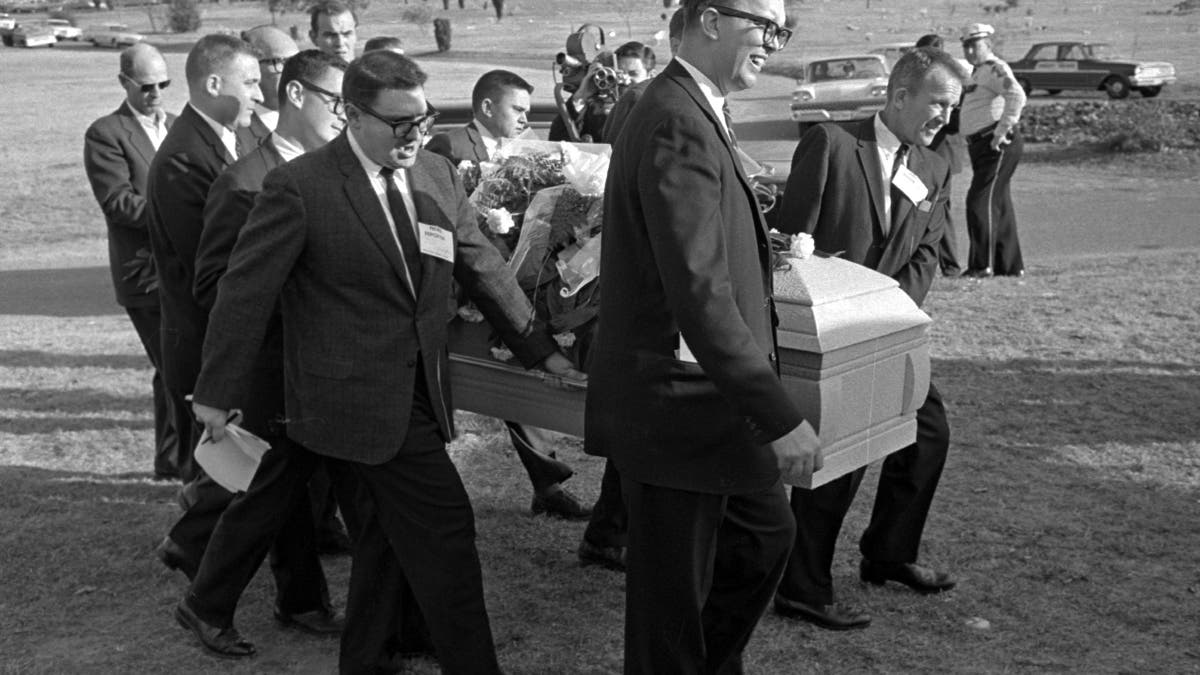
Reporters were enlisted to act as pall bearers at the interment of Lee Harvey Oswald at the Shannon Rose Hill Cemetery. Pallbearers from left end - Jerry Flemmons with crewcut and no glasses. In front of Flemmons are reporters Ed Horn and Mike Cochran. Funeral director Paul J. Groody was among the pallbearers. On the far side of the casket are Jon McConal, rear, and Preston McGraw, front. The pallbearer obscured behind Groody could not be identified. (AP Photo/Gene Gordon) (The Associated Press)
FORT WORTH, Texas – On a gloomy November afternoon, I helped carry the inexpensive wooden casket of Lee Harvey Oswald to a grave on a slight rise dotted with dying grass.
With no mourners around to serve as pallbearers, it was a task that fell to me and a few other reporters covering the funeral of John F. Kennedy's assassin. Fifty years later, I remain a reluctant and minor footnote in American history.
It was a story that began with a tip: Oswald would be buried at Rose Hill Cemetery in Fort Worth, where he had spent part of his childhood, just one day after nightclub owner Jack Ruby shot and killed him during a jail transfer on Nov. 24, 1963, itself just two days after Kennedy's death.
As the Fort Worth correspondent for The Associated Press, I drew the assignment.
I arrived to discover dozens of police and federal agents, writers and photographers, but no mourners waiting to bid Oswald goodbye or good riddance. A police escort delivered Oswald's casket in the early afternoon. Much later, officers arrived with his family: mother Marguerite, brother Robert, widow Marina and her two daughters, June Lee, 2, and infant Rachel.
No one else would follow; even the minister failed to show. Shaking his head ever so slightly, Jerry Flemmons of the Fort Worth Star-Telegram turned to me and said, "Cochran, if we're gonna write a story about the burial of Lee Harvey Oswald, we're gonna have to bury the son of a bitch ourselves."
Sure enough, officials asked the gathered reporters to serve as pallbearers. I was among the first they asked, my reply not just "No!" but "Hell no!" Then Preston McGraw of United Press International stepped forward and volunteered, and with my top competition for scoops accepting the duty, I realized my error and joined McGraw and other reporters.
The ceremony itself was as brief as it was simple. The Rev. Louis Saunders, executive secretary of the Fort Worth Council of Churches, had been drafted to fill in for the missing minister. His words — "we are not here to judge, only to commit for burial Lee Harvey Oswald" — were barely audible, mingled with muffled sobs by Oswald's mother and widow. Her eyes red and swollen, Marina Oswald stepped beside her husband's casket and quietly whispered something.
Not long after the nation's slain president was laid to rest at Arlington National Cemetery with tearful family members and millions of television viewers around the world looking on, Oswald's body was lowered into his grave at 4:28 p.m.
For years, I would continue to report on the assassination, interviewing Oswald's mother, investigating conspiracy theories and writing stories on the anniversary of that dreadful day in Dallas.
For one of the first of those anniversary stories, I wanted to interview Oswald's widow. She had remarried, moved to suburban Dallas and rarely spoke to reporters. Her new husband had reportedly brandished a pistol and chased one writer away.
Early on a cloudy November morning, I staked out their house and trudged up the steps after he left for work. I had not called ahead, but identified myself as an AP reporter when Marina Oswald opened the door.
"I am no longer news," she said, making it clear she did not intend to talk with me.
She was slim and blonde, with arresting eyes of an intense blue-green and a distinctive Russian accent. She was 24 and I must have stared like a smitten dolt.
"Is something wrong?" she asked.
Embarrassed, I babbled something about not having seen her since that day at Rose Hill.
"You were there?" she asked. I told her I was a pallbearer.
Surprised, she said the least she could do was invite me in for coffee. Several hours later, we were still talking and smoking. Denied cigarettes by Oswald during their marriage, she was now a chain smoker.
"Have you ever tried to analyze yourself?" she asked me at one point, then added: "It's very hard to do."
Asked about the Warren Commission's conclusion that her husband was the lone assassin, she said: "I think about it a lot. I try to forget. It is very difficult. It is like a nightmare. ... I have nightmares."
Years later, in 1983, when working on a story about the 20th anniversary, I interviewed Marina Oswald for the second and last time. She was no less candid and still a heavy smoker.
"For a while I thought it would all blow over, just go away," she said. "But now I accept the fact that I must live with this the rest of my life.
"I may still be naive, but I'm not stupid."
___
Editor's Note: Mike Cochran was AP's Fort Worth correspondent in 1963 and retired from the company in 1999.





















